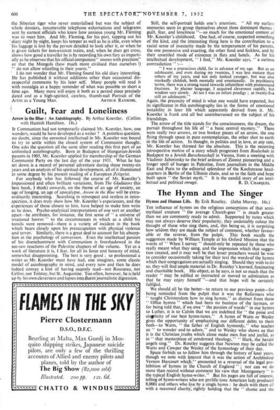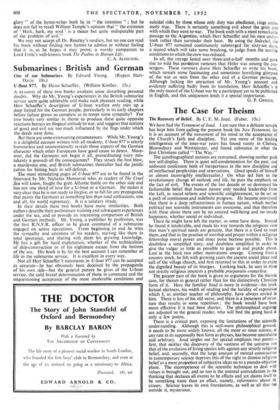The Hymn and The Singer
Hymns and Human Life. By Erik Routley. (John Murray. I 6s.)
THE influence of hymns on the religious conceptions of that semi- mythical creature " the average Church-goer ' is much greater than we are commonly ready to admit. Supported by tunes which may not always deserve their popularity, they undeniably colour the thought of those who sing them, and, this being so, it is surprising how seldom they are made the subject of comment, whether favour- able or the reverse, from the pulpit. This book recalls the suggestion made by William Temple at his Oxford Mission that the words of " When I survey " should only be repeated by those who really meant what they sang, and the impression which that sugges- tion created, and it may well be that lesser preachers would be wise to consider occasionally taking for their text the words•of the hymns which their congregation are actually singing. Should they wish to do so, they will find ample material in Dr. Routley's learned, fascinating and charitable book. His object, as he says, is not so much that the reader – may be edified or instructed or moved to admiration as that he may enjoy himself "—and that hope will be certainly fulfi'led.
We should all be the better—to return to our previous point—for being reminded from the pulpit that it was the Reformers who " taught Christendom how to sing hymns," as distinct from those " Office hymns " which had been no business of the layman, or for being told that, if we owe " the pasSion of words" in our hymns to Luther, it is to Calvin that we are indebted for " the poise and sinaplicity of our best hymn-tunes." A hymn of Watts or Wesley gives the opportunity of emphasising our different debts to them both—to Watts, " the father of English hymnody," who teaches us " to wonder and to adore," and to Wesley who shows us that it is the Christian,truths which alone make men free and joyful, as in " that masterpiece of condensed theology," " Hark, the herald angels sing." Dr. Routley suggests that Newton may be called the Watts and Cowper the Wesley of the hymnology of their day.
Space forbids us to follow him through the history of later years, though we note with interest that it was the action of Archbishop Vernon Harcourt which " amounted to a reversal of the legal pro- hibition of hymns in the Church of England " ' • nor can we do more than record without comment his view that Montgomery " is the typical English hymn-writer." But his pages are full of interest, telling of hymn-writers who are prolific (one American lady produced 8,000) and others who live by a single hymn : he deals with them all with a reasoned charity, rightly holding that the " shame and the glory " of the hymn-writer both lie in " the intention " ; but he does not fail to recall William Temple's opinion that " the existence of ' Hark, hark, my soul ' is a minor but quite indisputable part of the problem of evil."
We may not accept all Dr. Routley's verdicts, but no one can read his book without finding new hymns to admire or without feeling that it is, as he hopes it may prove, a worthy companion to Lord Ernle's well-known book The Psalms in Human Life.
C. A. ALINGTON.



































 Previous page
Previous page